How to create a financial forecast for a content marketing agency?
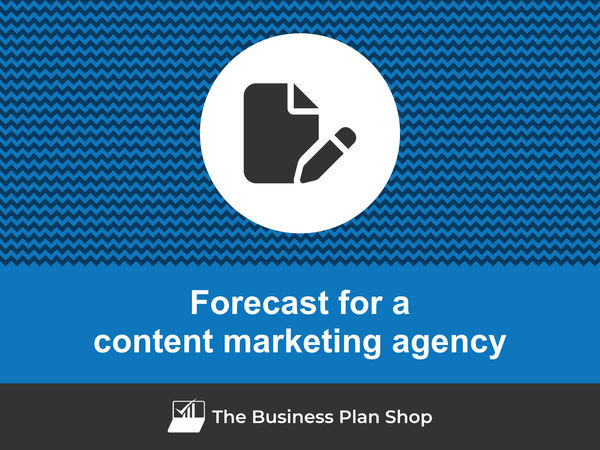
If you are serious about keeping visibility on your future cash flows, then you need to build and maintain a financial forecast for your content marketing agency.
Putting together a content marketing agency financial forecast may sound complex, but don’t worry, with the right tool, it’s easier than it looks, and The Business Plan Shop is here to guide you.
In this practical guide, we'll cover everything you need to know about building financial projections for your content marketing agency.
We will start by looking at why they are key, what information is needed, what a forecast looks like once completed, and what solutions you can use to create yours.
Let's dive in!
Why create and maintain a financial forecast for a content marketing agency?
Creating and maintaining an up-to-date financial forecast is the only way to steer the development of your content marketing agency and ensure that it can be financially viable in the years to come.
A financial plan for a content marketing agency enables you to look at your business in detail - from income to operating costs and investments - to evaluate its expected profitability and future cash flows.
This gives you the visibility needed to plan future investments and expansion with confidence.
And, when your trading environment gets tougher, having an up to date content marketing agency forecast enables you to detect potential upcoming financing shortfalls in advance, enabling you to make adjustments or secure financing before you run out of cash.
It’s also important to remember that your content marketing agency's financial forecast will be essential when looking for financing. You can be 100% certain that banks and investors will ask to see your numbers, so make sure they’re set out accurately and attractively.
Need a convincing business plan?
The Business Plan Shop makes it easy to create a financial forecast to assess the potential profitability of your projects, and write a business plan that’ll wow investors.

What information is used as input to build a content marketing agency financial forecast?
A content marketing agency's financial forecast is only as good as the inputs used to build it.
If you are creating (or updating) the forecast of an existing content marketing agency, then you mostly need your accounting information, key historical operating non-financial data, and your team’s input on what to expect for the coming years.
If you are building financial projections for a content marketing agency startup, you will need to have done your research and have a clear picture of your competitive environment and go-to-market strategy so that you can forecast sales accurately.
For a new venture, you will also need a precise list of the resources needed to keep the content marketing agency running on a day-to-day basis and a list of the equipment and expenditures required to start the business (more on that later).
Let's now take a closer look at the elements that make up your content marketing agency's financial forecast.
The sales forecast for a content marketing agency
From experience, it is usually best to start creating your content marketing agency financial forecast by your sales forecast.
To create an accurate sales forecast for your content marketing agency, you will have to rely on the data collected in your market research, or if you're running an existing content marketing agency, the historical data of the business, to estimate two key variables:
- The average price
- The number of monthly transactions
To get there, you will need to consider the following factors:
- Your reputation and portfolio: As a content marketing agency, your reputation and portfolio play a significant role in determining your average price and number of monthly transactions. Clients are willing to pay more for high-quality content from a reputable agency with a track record of successful campaigns.
- Your target market and niche: The type of clients you target and the specific niche you cater to can impact your average price and monthly transactions. If you specialize in providing content marketing services to a niche market, you may be able to charge a higher price due to your expertise and the demand for your services.
- Your team's expertise and skills: The skill level and expertise of your team can also affect your average price and number of monthly transactions. Clients are willing to pay more for content created by experienced and knowledgeable professionals who can deliver results.
- Your pricing strategy: Your pricing strategy can directly impact your average price and monthly transactions. If you offer package deals or discounts, you may attract more clients, but your average price may decrease. On the other hand, if you have a premium pricing strategy, your average price may increase, but you may have fewer monthly transactions.
- Your competition: The level of competition in the content marketing industry can also influence your average price and monthly transactions. If there are many other agencies offering similar services in your area, you may need to adjust your prices to remain competitive and attract clients. However, if you have a unique selling proposition and stand out from your competitors, you may be able to charge higher prices and still maintain a steady flow of monthly transactions.
Once you have an idea of what your future sales will look like, it will be time to work on your overhead budget. Let’s see what this entails.
Need a convincing business plan?
The Business Plan Shop makes it easy to create a financial forecast to assess the potential profitability of your projects, and write a business plan that’ll wow investors.

The operating expenses for a content marketing agency
The next step is to estimate the expenses needed to run your content marketing agency on a day-to-day basis.
These will vary based on the level of sales expected, and the location and size of your business.
But your content marketing agency's operating expenses should include the following items at a minimum:
- Staff Costs: This includes salaries, benefits, and any other expenses related to hiring and retaining employees to work on content creation, marketing, and other related tasks.
- Accountancy Fees: You may need to hire an accountant or bookkeeper to handle your company's finances, taxes, and other financial tasks.
- Insurance Costs: As a content marketing agency, you may need to have liability insurance to protect your business in case of any legal issues or claims.
- Software Licences: You will need to invest in various software licenses for content creation, project management, marketing automation, and other tools to run your agency efficiently.
- Marketing Expenses: This includes any expenses related to promoting your agency, such as advertising, events, sponsorships, and other marketing initiatives.
- Office Rent: If you have a physical office, you will need to pay rent for the space, utilities, and other related expenses.
- Website Hosting and Maintenance: Your agency's website is a crucial tool for attracting clients, and you will need to pay for hosting, domain registration, and ongoing maintenance costs.
- Travel Expenses: You may need to travel for client meetings, industry events, and other business-related trips, and these expenses can add up quickly.
- Training and Development: To stay competitive in the content marketing industry, you will need to invest in ongoing training and development for your team.
- Office Supplies: This includes any expenses related to office supplies, such as stationery, printers, computers, and other equipment.
- Telecommunication Costs: As a content marketing agency, you will need to communicate with clients, team members, and other stakeholders, which will require phone and internet services.
- Professional Memberships: You may need to pay for memberships to professional organizations and associations to stay updated on industry trends and network with other professionals.
- Client Entertainment: Building strong relationships with clients is essential in the content marketing industry, and you may need to entertain them occasionally to maintain these relationships.
- Banking Fees: This includes any fees related to bank accounts, credit cards, and other financial transactions for your agency.
- Legal Fees: You may need to seek legal advice or services for contracts, copyright issues, or other legal matters related to your agency.
This list is, of course, not exhaustive, and you'll have to adapt it according to your precise business model and size. A small content marketing agency might not have the same level of expenditure as a larger one, for example.
What investments are needed to start or grow a content marketing agency?
Your content marketing agency financial forecast will also need to include the capital expenditures (aka investments in plain English) and initial working capital items required for the creation or development of your business.
For a content marketing agency, these could include:
- Office Equipment: This includes items such as computers, printers, and office furniture that are necessary for day-to-day operations of your content marketing agency.
- Software and Tools: Content marketing agencies rely heavily on various software and tools to create, manage, and track content. This can include content management systems, analytics tools, and design software.
- Website and Branding: Building a strong online presence is crucial for a content marketing agency. This may involve investing in a professional website design, branding materials, and search engine optimization services.
- Training and Development: While training and development may be considered an operating expense, investing in the skills and knowledge of your team is crucial for the success of your agency. This may include attending industry conferences, workshops, and online courses.
- Office Space: Depending on the size and location of your agency, renting or purchasing office space may be a significant capital expenditure. This includes lease payments, renovations, and necessary equipment for the office.
Again, this list will need to be adjusted according to the size and ambitions of your content marketing agency.
Need a convincing business plan?
The Business Plan Shop makes it easy to create a financial forecast to assess the potential profitability of your projects, and write a business plan that’ll wow investors.

The financing plan of your content marketing agency
The next step in the creation of your financial forecast for your content marketing agency is to think about how you might finance your business.
You will have to assess how much capital will come from shareholders (equity) and how much can be secured through banks.
Bank loans will have to be modelled so that you can separate the interest expenses from the repayments of principal, and include all this data in your forecast.
Issuing share capital and obtaining a bank loan are two of the most common ways that entrepreneurs finance their businesses.
What tables compose the financial plan for a content marketing agency?
Now let's have a look at the main output tables of your content marketing agency's financial forecast.
The projected profit & loss statement
The projected profit & loss shows how profitable your content marketing agency is likely to be in the years to come.
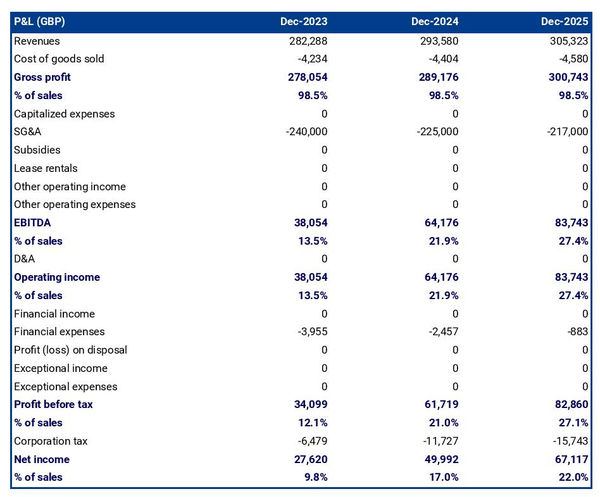
For your content marketing agency to be financially viable, your projected P&L should ideally show:
- Sales growing above inflation (the higher the better)
- Profit margins which are stable or expanding (the higher the better)
- A net profit at the end of each financial year (the higher the better)
This is for established content marketing agencies, there is some leniency for startups which will have numbers that will look a bit different than existing businesses.
The projected balance sheet
The projected balance sheet gives an overview of your content marketing agency's financial structure at the end of the financial year.
It is composed of three categories of items: assets, liabilities and equity:
- Assets: are what the business possesses and uses to produce cash flows. It includes resources such as cash, buildings, equipment, and accounts receivable (money owed by clients).
- Liabilities: are the debts of your content marketing agency. They include accounts payable (money owed to suppliers), taxes due and bank loans.
- Equity: is the combination of what has been invested by the business owners and the cumulative profits to date (which are called retained earnings). Equity is a proxy for the value of the owner's stake in the business.
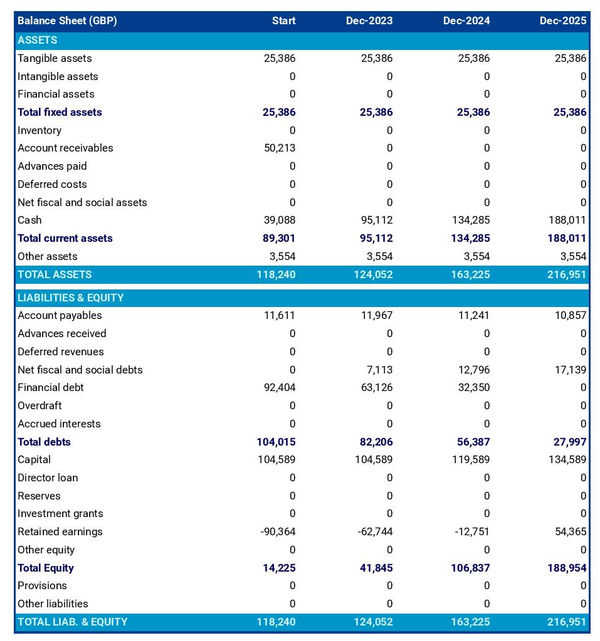
The projected cash flow statement
A projected cash flow statement for a content marketing agency is used to show how much cash the business is generating or consuming.
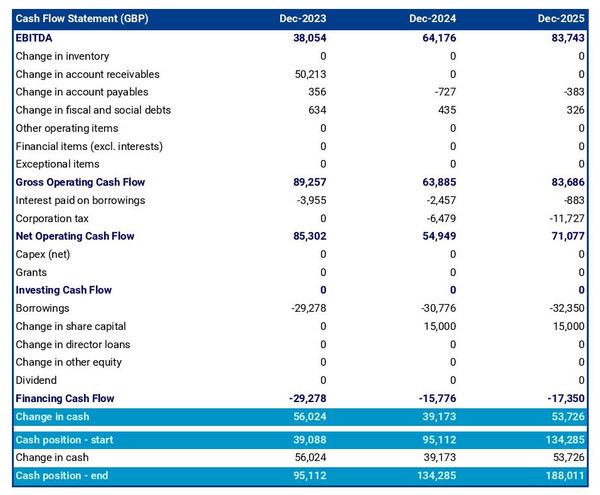
The cash flow forecast is usually organised by nature to show three key metrics:
- The operating cash flow: do the core business activities generate or consume cash?
- The investing cash flow: how much is the business investing in long-term assets (this is usually compared to the level of fixed assets on the balance sheet to assess whether the business is regularly maintaining and renewing its equipment)?
- The financing cash flow: is the business raising new financing or repaying financiers (debt repayment, dividends)?
Cash is king and keeping an eye on future cash flows is imperative for running a successful business. Therefore, you should pay close attention to your content marketing agency's cash flow forecast.
If you are trying to secure financing, note that it is customary to provide both yearly and monthly cash flow forecasts in a financial plan - so that the reader can analyze seasonal variation and ensure the content marketing agency is appropriately capitalised.
Need a convincing business plan?
The Business Plan Shop makes it easy to create a financial forecast to assess the potential profitability of your projects, and write a business plan that’ll wow investors.

Which tool should you use to create your content marketing agency's financial forecast?
Using the right tool or solution will make the creation of your content marketing agency's financial forecast much easier than it sounds. Let’s explore the main options.
Using online financial forecasting software to build your content marketing agency's projections
The modern and easiest way is to use an online financial forecasting tool such as the one we offer at The Business Plan Shop.
There are several advantages to using specialised software:
- You can easily create your financial forecast by letting the software take care of the financial calculations for you without errors
- You have access to complete financial forecast templates
- You get a complete financial forecast ready to be sent to your bank or investors
- You can easily track your actual financial performance against your financial forecast, and recalibrate your forecast as the year goes by
- You can create scenarios to stress test your forecast's main assumptions
- You can easily update your forecast as time goes by to maintain visibility on future cash flows
- You have a friendly support team on standby to assist you when you are stuck
- It’s cost-efficient and much cheaper than using an accountant or consultant (see below)
If you are interested in this type of solution, you can try our projection software for free by signing up here.
Calling in a financial consultant or chartered accountant
Enlisting the help of a consultant or accountant is also a good way to obtain a professional content marketing agency financial forecast.
The downside of this solution is its cost. From experience, obtaining a simple financial forecast over three years (including a balance sheet, income statement, and cash flow statement) is likely to cost a minimum of £700 or $1,000.
The indicative cost above, is for a small business, and a forecast is done as a one-shot exercise. Using a consultant or accountant to track your actuals vs. forecast and to keep your financial projections up to date on a monthly or quarterly basis will cost a lot more.
If you opt for this solution, make sure your accountant has in-depth knowledge of your industry, so that they may challenge your figures and offer insights (as opposed to just taking your assumptions at face value to create the forecast).
Why not use a spreadsheet such as Excel or Google Sheets to build your content marketing agency's financial forecast?
You and your financial partners need numbers you can trust. Unless you have studied finance or accounting, creating a trustworthy and error-free content marketing agency financial forecast on a spreadsheet is likely to prove challenging.
Financial modelling is very technical by nature and requires a solid grasp of accounting principles to be done without errors. This means that using spreadsheet software like Excel or Google Sheets to create accurate financial forecasts is out of reach for most business owners.
Creating forecasts in Excel is also inefficient nowadays:
- Software has advanced to the point where forecasting can be done much faster and more accurately than manually on a spreadsheet.
- With artificial intelligence, the software is capable of detecting mistakes and helping decision-making.
Spreadsheets are versatile tools but they are not tailor-made for reporting. Importing your content marketing agency's accounting data in Excel to track actual vs. forecast is incredibly manual and tedious (and so is keeping forecasts up to date). It is much faster to use dedicated financial planning tools like The Business Plan Shop which are built specially for this.
Need a convincing business plan?
The Business Plan Shop makes it easy to create a financial forecast to assess the potential profitability of your projects, and write a business plan that’ll wow investors.

Use our financial forecast templates for inspiration
The Business Plan Shop has dozens of financial forecast examples available.
Our templates contain both a financial forecast and a written business plan which presents, in detail, the company, the team, the strategy, and the medium-term objectives.
Our templates are a great source of inspiration, whether you just want to see what a complete business plan looks like, or are looking for concrete examples of how you should model financial elements in your own forecast.
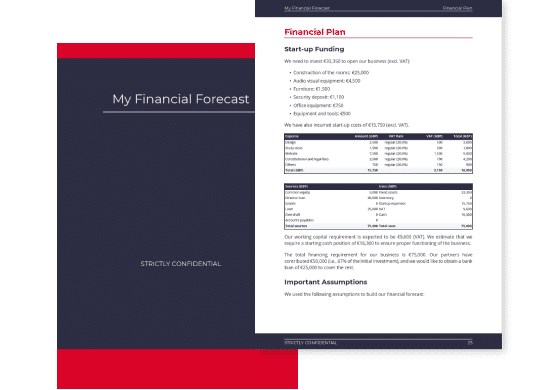
Takeaways
- A financial projection shows expected growth, profitability, and cash generation for your business over the next three to five years.
- Tracking actuals vs. forecast and keeping your financial forecast up-to-date is the only way to maintain visibility on future cash flows.
- Using financial forecasting software makes it easy to create and maintain up-to-date projections for your content marketing agency.
You have reached the end of our guide. We hope you now have a better understanding of how to create a financial forecast for a content marketing agency. Don't hesitate to contact our team if you have any questions or want to share your experience building forecasts!
Need a convincing business plan?
The Business Plan Shop makes it easy to create a financial forecast to assess the potential profitability of your projects, and write a business plan that’ll wow investors.

Also on The Business Plan Shop
- Example of financial projections
- How to project revenues for a business?
- Financial forecast template for a business idea
Know someone who runs or wants to start a content marketing agency? Share our financial projection guide with them!




